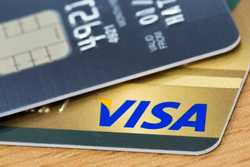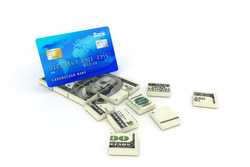How to Pay a Credit Card Bill: 5 Ways

Our evaluations and opinions are not influenced by our advertising relationships, but we may earn a commission from our partners’ links. This content is created by TIME Stamped, under TIME’s direction and produced in accordance with TIME’s editorial guidelines and overseen by TIME’s editorial staff. Learn more about it.
Using a credit card means you are borrowing money for purchases, whether it’s your latest Amazon or Target haul or covering a recent visit to the dentist. Having a credit card also entails paying back the money you borrowed. Staying on top of credit card payments is essential for building or maintaining a positive credit history. Knowing how and when to pay your bill can help you avoid costly late fees and higher interest rates.
Most card issuers offer several ways to make credit card payments. Payment methods can vary depending on who issued the card, but can include online or mobile payments, by phone or mail, or in person at a local office or branch.
When a card issuer approves you for a credit card, or you receive it in the mail, you're usually instructed to create an online account if you don't have one already. Your online card account provides detailed information on your account, card transactions, and payment history.
You can also pay your monthly card bill online through your account. To do so, you must first link a payment method, typically a bank account, to your credit card account. Input your bank account's routing number and your account number when instructed to do so. Once your payment method is linked, you can make payments online. You also may be able to transfer funds to your bill if your credit card and bank account are with the same institution.
Card issuers often allow you to make immediate payments, schedule payments for a specific date, or set up automatic monthly payments.
If your card issuer has a mobile app, you can download it and access your online account. Navigate to the payment section of the app to schedule your payment similarly to an online payment. Some banking or credit card apps feature virtual assistants to help complete basic tasks, including making payments. Check your mobile app for issuer-specific options and instructions.
Some issuers allow cardholders to pay their bill over the phone. This option is helpful if you cannot access digital options or prefer to pay non-digitally. Call the customer service phone number on the back of your card unless the issuer instructs you otherwise.
Depending on the issuer, you might make your phone payment through an automated system or by speaking directly to a customer service representative. The issuer will ask you to provide personal information, including your credit card number, date of birth, or other information, to verify your identity before they can access your account or process payments.
Many card issuers allow you to send a check by mail for payment. Mail payments take longer to process because of the transit time required. Your issuer may provide a payment form with your monthly statement that you can mail with your payment. Be sure to write your credit card account number in the check memo area to expedite payment processing. Card issuers typically do not accept cash payments by mail.
If your card issuer or bank has local offices or branches, it may allow you to pay your credit card bill in person. In-person payments are likely the only time your issuer will accept cash payments, although you can still write a check if you prefer. Check with your issuer to see if they operate physical branches or financial centers in your area and if they accept in-person payments.
You should always pay your bill each month before its due date. On-time payments help you avoid late fees and negative marks on your credit report. Credit cards come with two important dates to remember—your statement date and the due date. The statement date, or closing date, occurs one day a month and signifies the end of a billing cycle. All account activity during a billing cycle, including charges, payments, and credits, appears on your statement. The due date is the day each month when your payment is due. You must make at least the minimum payment at this time to avoid a late fee.
Most issuers allow you to make payments at any time. If you're carrying a balance and you pay your bill early and in full, you can avoid additional interest charges. Card issuers report balances to credit bureaus. Having a lower balance during reporting could boost your credit score.
Credit card issuers typically allow you to carry a balance on your card as long as you consistently make minimum payments. When you have a balance, the issuer charges interest on the balance amount, essentially increasing the cost of card purchases.
Carrying a balance won't help build credit, but making on-time payments can. So can paying off your balance, which decreases your credit utilization, or the amount of available credit you use. Depending on your spending habits, carrying a balance could lead to mounting card debt that's difficult to pay off due to added interest charges each month.
For these reasons it's best to avoid carrying a balance whenever possible. If it's unavoidable, work to keep your balance under control and create a plan to pay it off as quickly as possible. A balance transfer credit card could help, especially if it comes with an introductory 0% annual percentage rate (APR) for an extended period. Keep in mind that issuers typically charge a fee on transfers. Calculate the transfer fee compared to your current card's APR to determine if you can save money through a balance transfer.
Credit card issuers must provide your credit card statement at least 21 days before your payment due date. The payment due date must be on the same day each month for each billing cycle, typically lasting 30 days or longer.
Card issuers usually set these dates, but some allow you to periodically request a change of your due date or statement closing date.
Making smart choices with your credit cards can help you improve your credit profile and build positive financial habits. Here are some tips for staying on top of your credit card payments.
Credit cards work best when you stick to a budget. Try to only spend what you can afford to pay off at the end of the month.
Making on-time payments is the best way to build a positive credit profile using credit cards. If you carry a balance, make sure to at least make minimum payments each month by the payment due date. Of course, paying your balance in full is even better and will help you avoid interest charges.
A simple way to ensure you never have a late payment is to set up automatic payments through your credit card issuer. You can set payments to the minimum required or for a specific amount. You can still make additional payments to pay off your balance quicker, but setting up auto payments ensures you're never late.
Another way to avoid late payments is to set reminders for yourself to pay your credit card bills. Utilize digital calendars and other tools to remind you each month when a payment is due.
Minimum payments help you avoid late fees but won't help you escape the interest your issuer charges for carrying a balance each month. Look for extra cash in your budget to apply to your card balance.
Familiarize yourself with your card issuer after being approved for a credit card. Learn how it operates, how to pay your bill, the card's APR, fees, and any guidelines or restrictions. Set up a system for card payments based on your due dates and monthly budget. Use your credit card responsibly to build up your credit and avoid spending more than necessary.
Online or mobile payments are often the safest way to pay credit card bills. Banks and financial institutions employ the latest cybersecurity and encryption technology to protect your information and transactions. Still, use safe practices when making online payments, like avoiding public Wi-Fi networks or clicking on suspicious links in emails or texts.
Most card issuers allow you to pay your credit card bill online by logging into your account. If you have more than one account with the issuer, navigate to the correct account, looking for the payment option. To make a payment online, you must first connect a payment method to the account, typically a bank account.
You can carry a balance each month, but it won't help you build credit and could leave you paying expensive interest charges. Paying your credit card bill on time and in full each month enables you to avoid late fees and interest charges and builds a positive payment history, which can help boost your credit score.
The information presented here is created by TIME Stamped and overseen by TIME editorial staff. To learn more, see our About Us page.



